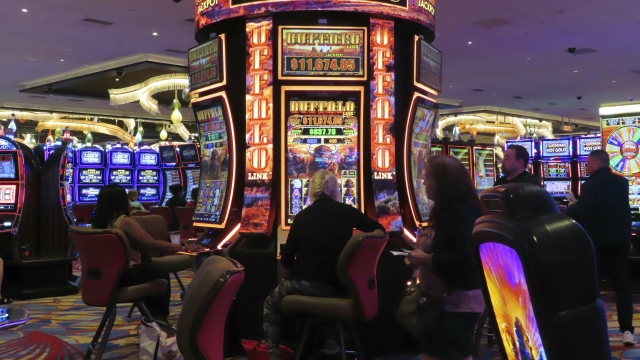Brian Hatch says it's been more than eight years since he last placed a bet.
Hatch isn't afraid to take those who tune in to his podcast, "All In: The Addicted Gambler's podcast," back to the lowest parts of his life.
For more than a dozen years, he says, he spent multiple nights a week, many times until 5 a.m., at casino blackjack tables.
"I was just in a position where because of gambling I never graduated college. I was academically dismissed after my first year because I was always at the casino," Hatch says.
He doesn't have an exact amount of money he gambled away, but he says he lost most of what he earned for more than a decade working as many of three jobs.
For Hatch, broadcasting his gambling addiction fight is as much therapy as it is a call to others, like Steven Delaney.
"The second half of 2020, I took approximately $20,000 from my 401(k) and basically I would max out a credit card and pay that off and tell myself I wasn't going to do it again, and then the next day I'd be racking up the credit card again," says Delaney.
Delaney found Hatch's podcast as he struggled with an addiction to online sports betting two years ago.
The New York delivery driver said he's struggled with substance abuse in the past but says help is harder to find for gambling addictions.
"There's multiple (substance abuse) rehabs in the town I'm delivering to right now. I only know of a few gambling rehabs in the entire country," Delaney says.
More than $3 billion was legally bet on the NCAA basketball tournament last year, according to the American Gaming Association.
Since 2018, 32 states have joined Nevada in making sports betting legal.
A person is seven times more likely to have a substance use disorder than a gambling addiction, according to the National Association of Administrators for Disordered Gambling Services.
In NAADGS' most recent survey, researchers found the amount of public money put into substance use treatment programs is 338 times larger than gambling treatment programs.
Because gambling legalization is a state issue, no federal money is put toward gambling addiction treatment programs, unlike programs for substances like opioids, according to the National Council on Problem Gambling.
"Alcohol is a good model — you have to have community-based education prevention when you're young so by the time the bartender cuts you off, that's not the first time anyone has talked to you about your alcohol use," says Keith Whyte, the Executive Director of the National Council on Problem Gambling.
One effort Whyte supports is requiring online gaming companies to use Artificial Intelligence software, like what Mindway AI in Denmark is developing.
Mindway AI's technology is being used currently being used in places like Europe and Asia but not as widely in the United States.
"You and I are two different individual human beings and so is our behavior, and when it comes to gambling, definitely our behavior would be different and individual," says Rasmus Kjaergaard, Mindway AI's CEO.
The artificial intelligence acts as a friend who might tap someone on the shoulder at a casino and ask if they need a break.
It learns your playing style, how much you like to bet, which games you like to play and how long you typically gamble. If you start showing signs of what may be considered problem gambling, like bigger bets and chasing losses, it can tell the app or online casino to ask if you're OK.
This year New Jersey became the first state to require gaming operators to use technology like this in gambling apps and online casinos.
"This is not a silver bullet yet and we may not know for a few more years whether it will be," says Alan Feldman.
Feldman is a former gaming executive who now studies responsible gaming at the University of Nevada Las Vegas.
His team is trying to learn more about the makeup of problem gamblers by studying how they handle money outside the casino. They're currently analyzing millions of anonymous gamer financial records and working on their own algorithm.
"The question remains: "So what?" Feldman says. "What's the distinction between someone who might need a little tap on the shoulder and say hey you might want to slow down here and someone you need to pull off the system and encourage them to go get treatment?"
When asked whether artificial intelligence could have helped in stopping his gambling addiction, Delaney said maybe, but he supports efforts to stop people before it's too late.
"Any roadblock you can put to make it more difficult for someone to bet and continue to lose money is a good thing," Delaney says.
All the responsible gambling experts interviewed for this story said AI could never replace the role of human intervention.
Hatch says this survey of three questions can be critical in helping someone know if they have a gambling problem.
"When you listen to a podcast right in your ear, nobody knows what you're doing, no one knows that you're trying to recover from gambling," Hatch says.
Today Delaney says he barely watches sports; this year's Super Bowl was the first game he's caught in two years.
"A lot of people who have knowledge in sports feel like we have this edge because we're so knowledgeable about players and sports and that we have this edge, but we what you don't realize is everyone is feeling that way," Delaney says.
Delaney now has his own gambling addiction recovery podcast called "Fantasy or Reality? The GPP."
Both Delaney and Hatch hope that by allowing gamblers to hear their stories, the two can prevent gambling from becoming a problem.
If you or someone you know is struggling with gambling, you can reach out to the National Problem Gambling Hotline at 1-800-522-4700.




